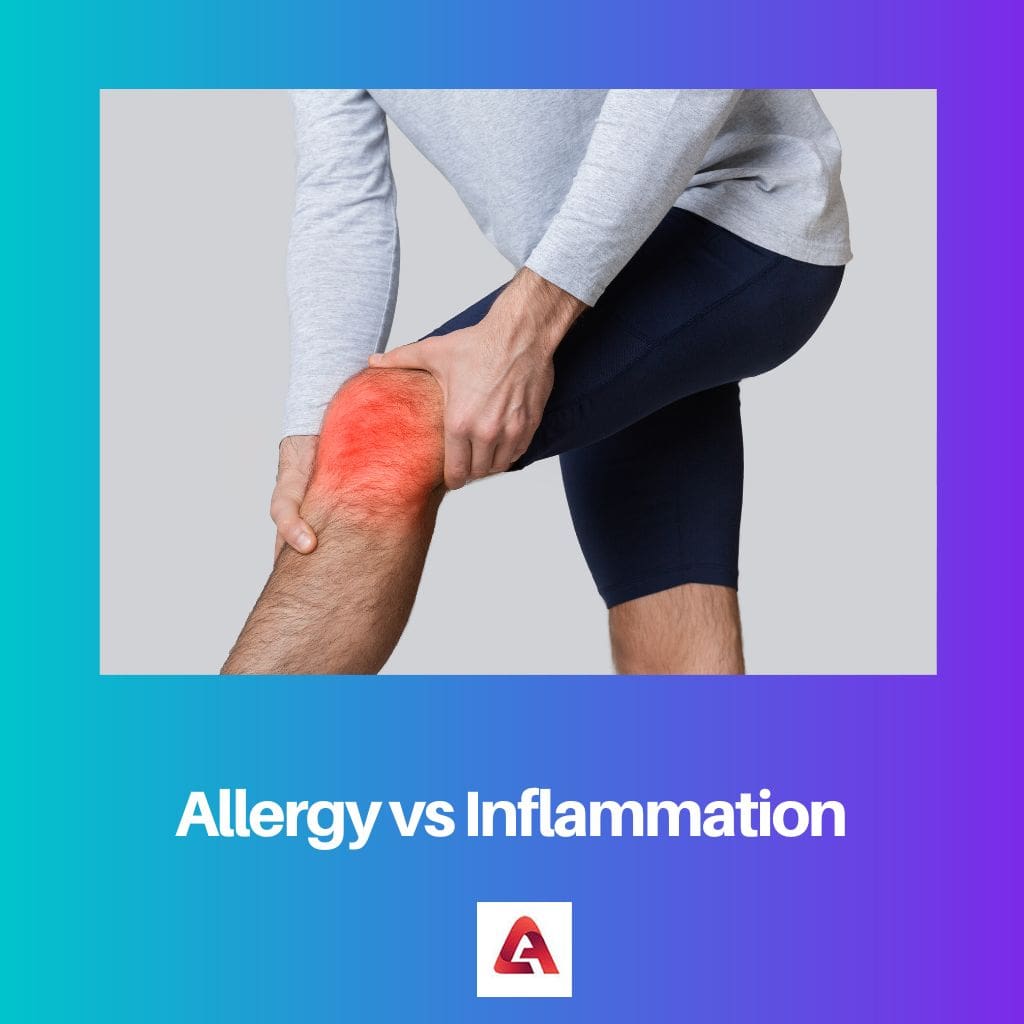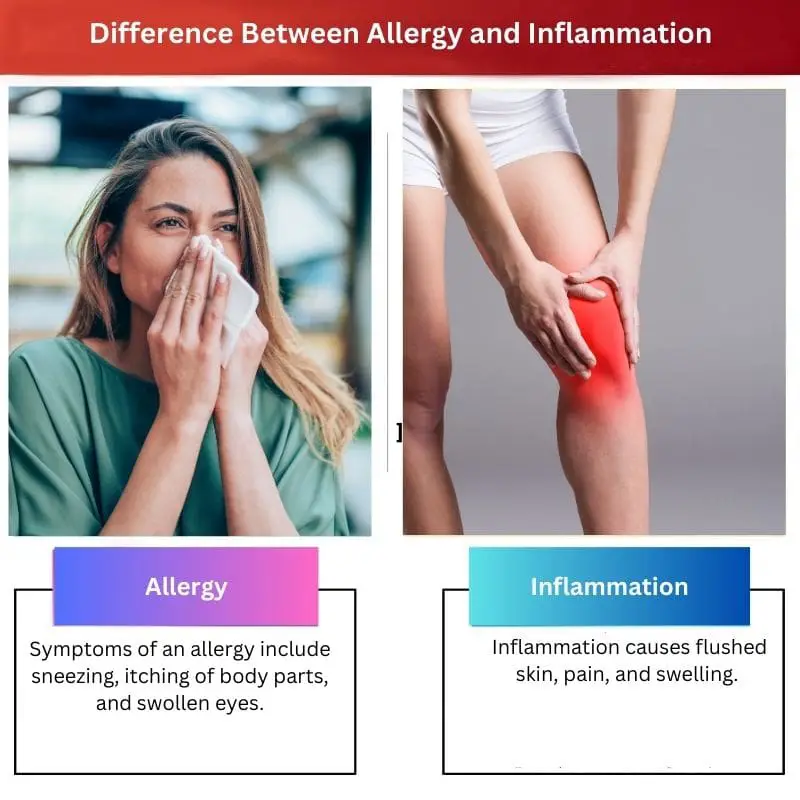Inflammation and allergy are 2 types of immunological responses caused by different triggers in the human body. Each allergic reaction causes inflammation.
However, not every inflammatory reaction is caused by an allergy. Furthermore, whereas inflammation does not need a genetic predisposition, allergy does.
Inflammation is the body’s natural response to danger.
To activate additional inflammatory cells, the immune system sends out early responses called cytokines.
Inflammation is classified into two types: acute inflammation and chronic inflammation.
Acute inflammation is a quick response to harm, such as a cut finger, but chronic inflammation occurs even when there is no external risk, like in rheumatoid arthritis.
Physical exams, X-rays, and blood tests such as C-reactive protein (CRP) and erythrocyte sedimentation rate can all be used to identify inflammation (ESR).
An allergy is a unique immunological response to a chemical invader, which is a protein or peptide.
This reaction needs a genetic predisposition; only those who express certain proteins are allergic to certain types of chemical exposure.
Sneezing, itching of the nose, eyes, and roofs of the mouth, watery, red, and swollen eyes, tingling in the mouth, swelling of the lips, tongue, face, throat, hives, anaphylaxis, rashes, cough, chest pains, short breath, and wheezing are all indications of an allergic response.
Allergen avoidance, medicines (antihistamines), immunotherapy, and emergency epinephrine are also therapeutic options for allergies.
Although every allergy causes inflammation, not every inflammatory reaction is caused by an allergy.
Key Takeaways
- Allergies are immune system reactions to specific substances, while inflammation is a general immune response to injury or infection.
- Symptoms of allergies can range from mild (sneezing, itching) to severe (anaphylaxis), while inflammation presents as redness, swelling, and sometimes pain.
- Treatment for allergies involves avoiding allergens, using antihistamines, and, in some cases, immunotherapy, while inflammation treatment includes anti-inflammatory medications and addressing the underlying cause.

Allergy vs Inflammation
Allergies result from the immune system’s response to something that is not harmful. For example, dust particles, pollens, certain fragrances, or eatables. Inflammation occurs when the body’s white blood cells gather to fight foreign agents that are harmful to the body’s healing process.
Comparison Table
| Parameter of Comparison | Allergy | Inflammation |
|---|---|---|
| Genetic predisposition | Need genetic predisposition | Do not need a genetic predisposition |
| Symptoms | Sneezing, itching, swollen eyes, etc. | Flushed skin, pain, swelling |
| Diagnosis | Physical examination, skin test, blood test | x-ray, blood test |
| treatment | Allergen avoidance, medications | Medicines, home remedies |
What is Allergy?
An allergy is a unique immunological response to a chemical invader, which is a protein or peptide. This reaction needs a genetic predisposition; only those who express certain proteins are allergic to certain types of chemical exposure.
Sneezing, itching of the nose, eyes, and roofs of the mouth, watery, red, and swollen eyes, tingling in the mouth, swelling of the lips, tongue, face, throat, hives, anaphylaxis, rashes, cough, chest pains, short breath, and wheezing are all indications of an allergic response.
Physical examination, skin test, and blood tests such as IgE testing, radioallergosorbent test (RAST), or immunoCAP test can be used to identify allergies. Allergen avoidance, medicines (antihistamines), immunotherapy, and emergency epinephrine are also therapeutic options for allergies.
Although every allergy causes inflammation, not every inflammatory reaction is caused by an allergy. Inflammation can also be caused by an irritant, which does not need a genetic predisposition and affects the whole population, or by hazardous bacteria; in this instance, the condition is known as an infection.

What is Inflammation?
Inflammation is the body’s natural response to danger. It is the process through which the immune system mobilizes its resources—for example, cells, tiny peptides known as cytokines, hormones, and so on—to combat an intruder such as bacteria, radiation, or a toxin.
The immune system sends out early responses called cytokines to activate additional inflammatory cells. Later, the cells initiate an inflammatory response to capture invading substances or to begin repairing wounded tissue.
Inflammation is classified into two types: acute inflammation and chronic inflammation. Acute inflammation is a quick response to harm, such as a cut finger, but chronic inflammation occurs even when there is no external risk, like in rheumatoid arthritis.
Physical exams, X-rays, and blood tests such as C-reactive protein (CRP) and erythrocyte sedimentation rate can all be used to identify inflammation (ESR).

Main Differences Between Allergy and Inflammation
- There is a need for a genetic predisposition for allergy however, inflammation does not require one
- Symptoms of an allergy include sneezing, itching of body parts, and swollen eyes, whereas inflammation causes flushed skin, pain, and swelling
- Allergy can be diagnosed through physical examination, skin, and blood tests. We can diagnose inflammation by x-ray and blood tests
- Treatment of allergies can be done through allergens avoidance and medication, while inflammation should be treated through medicines and home remedies.

- https://onlinelibrary.wiley.com/doi/abs/10.1111/j.1600-065X.2011.01020.x?casa_token=Sq5AMDyYRkoAAAAA:0h79m8wTbQyEcY2wWdGcB-bpExtwFM6QfUsgzWjKWS8-PzbbwO45pkFbs3cYU5dCqlgIyKYcUA15ePnZDQ
- https://onlinelibrary.wiley.com/doi/abs/10.1034/j.1398-9995.2000.00534.x?casa_token=rNza803YYXsAAAAA:xzELc45T0ssYxcxZP3668x6tNs56UKLJsQJLcF_ifMokCvPfJBTH7mVM-y11fAd6mRrSzVEiTedgXLjD_Q
